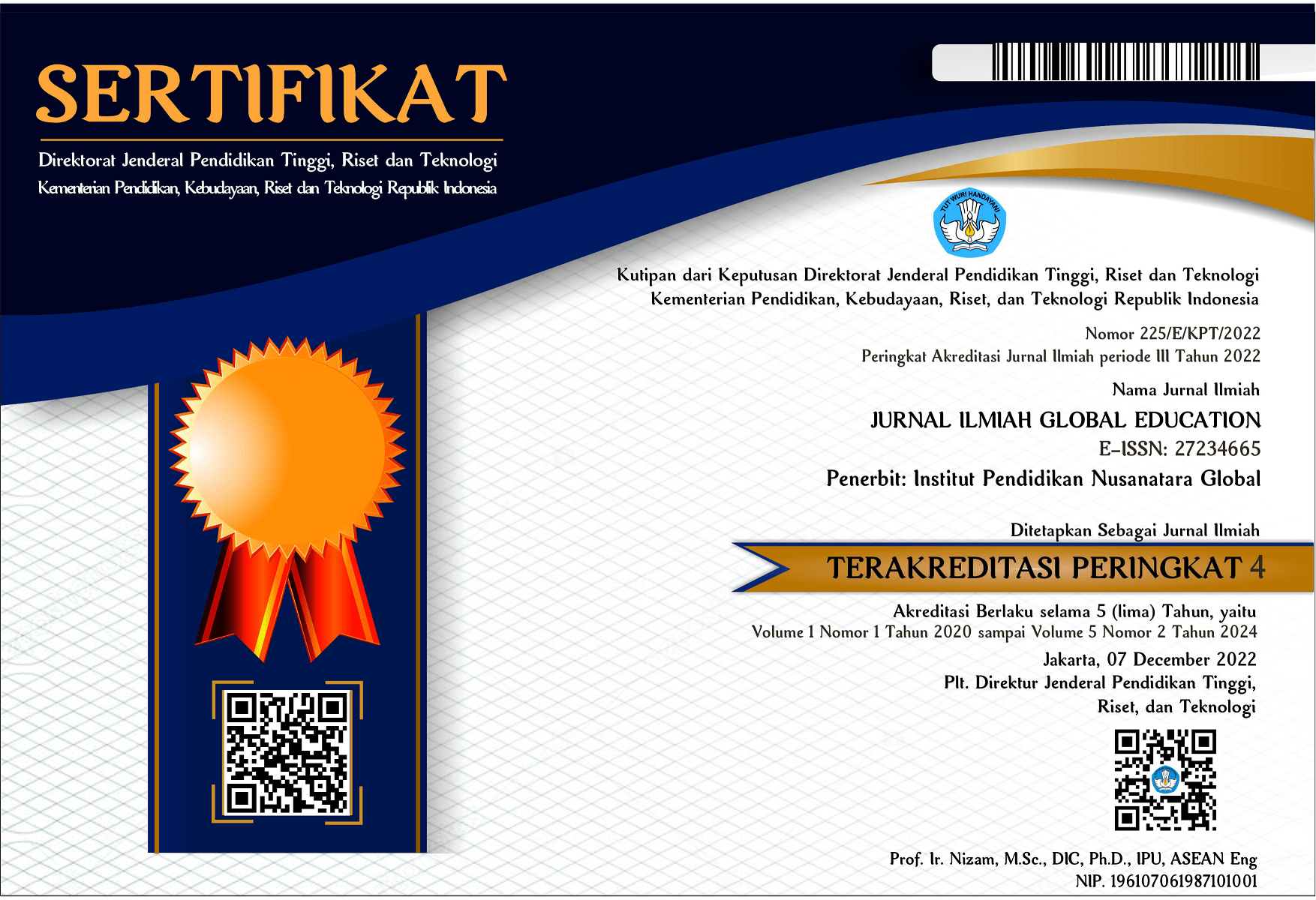PERAN PERILAKU KEWARGANEGARAAN ORGANISASI-INDIVIDU (OCB-I) PADA KINERJA KARYAWAN DAN NIAT UNTUK KELUAR DENGAN KETERIKATAKAN KARYAWAN SEBAGAI VARIABEL MEDIASI (STUDI KASUS DI ESTHY CAKE & BAKERY YOGYAKARTA)
DOI:
https://doi.org/10.55681/jige.v4i1.546Keywords:
OCB-I, Performance, Employee EngagementAbstract
This study aims to examine the role of OCB-I on performance and intention to leave with employee engagement as mediation. Methodology/Samples/Approach–Method of data collection by questionnaire. Methods of data analysis using regression analysis with SPSS computer program. The population research model is 59 employees. Quantitative analysis approach. Research Results–Individuals' direct organizational citizenship behavior plays a positive role on employee engagement, performance, and intention to leave. Besides that, employee engagement plays a positive role on performance and intention to leave. However employee engagement is not a direct mediator of individual organizational citizenship behavior on performance and intention to leave.
Downloads
References
Anwar Prabu Mangkunegara. (2011). Manajemen Sumber Daya Manusia Perusahaan. Bandung: PT. Remaja Rosda Karya.
Arikunto, S. (2016). Prosedur Penelitian Suatu Pendekatan Praktik. Jakarta: Rineka Cipta.
Arikunto, S. (2013). Prosedur Penelitian: Suatu Pendekatan Praktik. Jakarta: Rineka Cipta.
Bakker, A. B., & Demerouti, E. (2007). The job demands‐resources model: State of the art. Journal of managerial psychology.
Bakker, A. B., Schaufeli, W. B., Leiter, M. P., & Taris, T. W. (2008). Work engagement: An emerging concept in occupational health psychology. Work & stress, 22(3), 187-200.
Batilmurik, R., Noermijati, N., Sudiro, A., & Rochman, F. (2020). Individual citizenship pride: Is it the consequences of organisational citizenship behaviour-individual (OCB-I). International Journal of Scientific and Technology Research, 9(3), 3429-3434.
Chen. L. T. (2005). Exploring the Relationship among Transformational and Transansactional Leadership Behavior, Job Satisfaction, Organisational Commitment. and Turnover on the IT Department of Research and Development in Shanghai, China Nova Southeastem University.
Creswell, John W. (2009). Research Design (Pendekatan Kualitatif, Kuantitatif, dan Mixed). Yogyakarta: Pustaka Pelajar.
Emami, M., Alizadeh, Z., Nazari, K., & Darvishi, S. (2012). Antecedents and consequences of organisational citizenship behaviour (OCB). Interdisciplinary journal of contemporary research in business, 3(9).
Fitria, Y., & Linda, M. R. (2020). Kepuasan Kerja: Sebagai Variabel Mediasi Hubungan Antara Employee Engagement dan Organizational Commitment. Jurnal Inspirasi Bisnis dan Manajemen, 4(1), 17-30.
Ghozali, Imam. (2013). Aplikasi Analisis Multivariate dengan Program IBM SPSS 21. Edisi 7. Badan Penerbit Universitas Diponegoro. Semarang.
Ghozali, Imam. (2016). Aplikasi Analisis Multivariete Dengan Program (IBM SPSS). Edisi 8. Badan Penerbit Universitas Diponegoro. Semarang.
Glissmeyer, M; Bishop J.W; Fass R.D. (2007). Role Conflict, Role Ambiguity, and Intention To Quit The Organization: The Case of Law Enforcement Officers'. Journal of Decision Sciences Institute Annual. pp. 158-469
Greenberg, Jerald & Baron, Robert (2003) Behavior in Organizations, 8 edition, Pearson education, Inc., Upper Saddle River, New Jersey.
Grasiaswaty, N., Ratna, F., & Setyasih, N. (2016). Adaptasi alat ukur organizational citizenship behavior (OCB) dengan peer review di Indonesia. In Seminar ASEAN 2nd Psychology & Humanity (pp. 318-325).
HakiM, L., & Rahardja, E. (2020). Pengaruh Perceived Organizational Support dan Self Efficacy Terhadap Niatan Keluar dengan Keterikatan Karyawan Sebagai Variabel Mediasi (Studi Pada Rumah Sakit Islam Sultan Agung) (Doctoral dissertation, UNDIP: Fakultas Ekonomika Dan Bisnis).
Harwiki, W. (2016). The impact of servant leadership on organization culture, organizational commitment, organizational citizenship behaviour (OCB) and employee performance in women cooperatives. Procedia-Social and Behavioral Sciences, 219, 283-290
Hermanto, Y. B., & Srimulyani, V. A. (2022). The Effects of Organizational Justice on Employee Performance Using Dimension of Organizational Citizenship Behavior as Mediation. Sustainability, 14(20), 13322.
Hermawan, H., Thamrin, H. M., & SUSILO, P. (2020). Organizational citizenship behavior and performance: the role of employee engagement. The Journal of Asian Finance, Economics and Business, 7(12), 1089-1097
Hughes, J. C., & Rog, E. (2008). Talent management: A strategy for improving employee recruitment, retention and engagement within hospitality organizations. International journal of contemporary hospitality management.
Lestari, E. R., & Ghaby, N. K. F. (2018). The influence of Organizational Citizenship Behavior (OCB) on employee's job satisfaction and performance. Industria: Jurnal Teknologi dan Manajemen Agroindustri, 7(2), 116-123.
MacKenzie, S.B., Podsakoff, P.M., & Jarvis, C.B. (2005). The Problem of Measurement Model Misspecification in Behavioral and Organizational Research and Some Recommended Solutions. Journal of Applied Psychology, Vol.90, No.4, pp.710- 730.
Mark´oczy, L., & Xin, K. (2004). The virtues of omission in Organizational CitizenshipBehavior.Retrieved from
http: //www.goldmark.org/livia/papers/ocb/ocb.pdf
Mahayasa, I. G. A., & Suartina, I. W. (2019). Peran Organizational Citizenship Behavior (OCB) Dalam Peningkatan Pencapaian Tujuan Organisasi: Sebuah Kajian Literatur. JUIMA: Jurnal Ilmu Manajemen, 9(2).
Mobley, Horner, & Hollingsworth. (1978). The relationship between human resource practices and Employee retention in public organisations: anexploratory Study conducted in the united arab emirates. Arab: International Journal of Business and Social Science.
Motaung, T. L., & Radebe, P. Q. (2018). Organisational commitment and job satisfaction as antecedents of organisational citizenship behaviour. Journal of Economics and Behavioral Studies, 10(6A (J)), 109-122.
Muliawan, Y., Perizade, B., & Cahyadi, A. (2017). Pengaruh Keterikatan Karyawan (Employee Engagement Terhadap Kinerja Karyawan Di PT. Badja Baru Palembang). Jurnal Ilmiah Manajemen Bisnis Dan Terapan, 2, 69-78.
Musoli, M., & Yamini, E. A. (2020). Peran Etika Kerja Islam dan Keterikatan Karyawan dalam Meningkatkan Organizational Citizenship Behaviour. JBTI: Jurnal Bisnis: Teori dan Implementasi, 11(3), 260-273.
Nadiri, H. &Tanova, C. (2010). An Investigation Of The Role Of Justice In Turnover Intentions, Job Satisfaction, &Organizational Citizenship Behavior In Hospitality Industry. International Journal of Hospitality Management. No. 29, pp.33-41.
Nufus, H. (2011). Pengaruh organizational citizenship behavior (OCB) terhadap kinerja karyawan di PT. Putra Pertiwi karya utama.
Organ, D. (1988), “Organizational citizenship behavior: the good soldier syndrome”, Lexington Books, Lexington.
Pradhan, R. K., & Jena, L. K. (2017). Employee performance at workplace: Conceptual model and empirical validation. Business Perspectives and Research, 5(1), 69-85.
Rantelimbong, O., & MAS'UD, F. (2016). Pengaruh Keterikatan Karyawan (Employee Engagement) Terhadap Kinerja Karyawan: Peran Jarak Kekuasaan (Power Distance) Sebagai Moderator (Studi Pada Patra Jasa Convention Hotel Semarang) (Doctoral dissertation, Fakultas Ekonomika dan Bisnis).
Robbins, Stephen P. (2001). Perilaku Organisasi: Konsep, Kontroversi, Aplikasi, Jilid 1, Edisi 8, Prenhallindo, Jakarta.
Saif-Ud-Din, M. I., & Adeel, M. (2016). Investigating the relationship of organizational citizenship behavior with job satisfaction, organizational commitment and turnover intention: Evidence from the banking sector of Pakistan. Global Journal of Management And Business Research.
Saks, Alan, M. (2006). Antecedents and consequences of employee engagement.
Journal of Managerial Psychology, vol. 21 (7). pp. 600-619.
Sari, A. P., Hermawan, A., & Affandi, M. J. (2020). Pengaruh Kepuasan Kerja dan Keterikatan Karyawan Terhadap Turnover Intention Karyawan (Studi Kasus: Restoran). Jurnal Aplikasi Bisnis dan Manajemen (JABM), 6(2), 258-258.
Schaufeli, W. B., & Bakker, A. B. (2004). Job demands, job resources, and their relationship with burnout and engagement: A multi‐sample study. Journal of Organizational Behavior: The International Journal of Industrial, Occupational and Organizational Psychology and Behavior, 25(3), 293- 315.
Schaufeli, W. B., Bakker, A. B., & Salanova, M. (2006). The measurement of work engagement with a short questionnaire: A cross-national study. Educational and psychological measurement, 66(4), 701-716.
Schaufeli, W. B., Salanova, M., González-Romá, V., & Bakker, A. B. (2002). The measurement of engagement and burnout: A two sample confirmatory factor analytic approach. Journal of Happiness studies, 3(1), 71-92.
Shields, M. A., & Ward, M. (2001). Improving nurse retention in the National Health Service in England: the impact of job satisfaction on intentions to quit. Journal of health economics, 20(5), 677-701.
Sopyan, K. (2018). Pengaruh Budaya Organisasi, Kepuasan Kerja, dan Keterikatan Karyawan (Employee Engagement) terhadap Kinerja Karyawan. Jurnal Ilmu Manajemen Dan Bisnis, 6(2), 14-18.
Sudarmanto. (2010). Kinerja dan Pengembangan Kompetensi SDM. Yogyakarta: Pustaka Pelajar.
Tjahjaningsih, C. C. E. (2016). Pengaruh employee engagement dan modal sosial terhadap kinerja karyawan dengan OCB (Organizational Citizenship Behaviour) sebagai mediasi (Studi pada Bank Jateng kantor pusat). Media Ekonomi dan Manajemen, 30(2).
Ulndag, O., Khan, S., & Guden, N. (2011). The effects of job satisfaction, organizational commitment, organizational citizenship behavior on turnover intentions. Hospitality Review, 29(2), 1.
Wei, Y. C. (2014). The benefits of organizational citizenship behavior for job performance and the moderating role of human capital. International Journal of Business and Management, 9(7), 87.
Williams, L. J. (1988), “Affective and non affective components of job satisfaction and organizational citizenship and–role behaviors”, PHD Thesis, Indiana University, Bloomington, IN.
Williams, L. J., & Anderson, S. E. (1991). Job satisfaction and organizational commitment as predictors of organizational citizenship and in-role behavior. Journal of Management, 17, 601-617.
Witasari, Lia. (2009). Analisis Pengaruh Kepuasan Kerja dan Komitmen Organisational terhadap Turnover Intentions (Studi Empiris padaNovotel Semarang). Tesis.Fakultas Ekonomi UNDIP Semarang.
Zurasaka, A. (2008). Teori Perilaku Organisasi, http://zurasaka.wordpress.com
/2008/11 /25/ perilaku-organisasi.
Zahra A., Shataw D., Kamran N., & Mostafa E. (2012). Antecedents and consequences of organisational citizenship behaviour (OCB). Interdisciplinary journal of contemporary research in business, 3(9).
Downloads
Published
How to Cite
Issue
Section
License
Copyright (c) 2023 JURNAL ILMIAH GLOBAL EDUCATION

This work is licensed under a Creative Commons Attribution-ShareAlike 4.0 International License.













